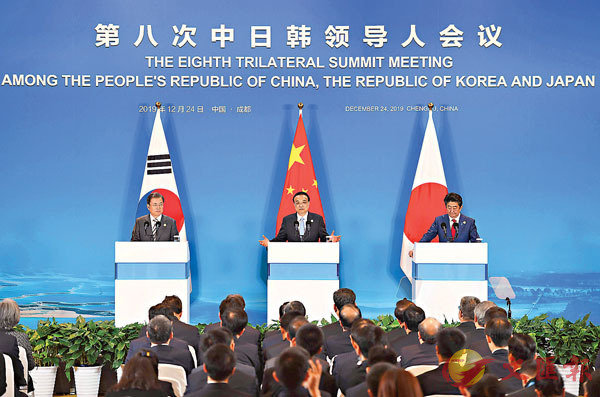 ■國務院總理李克強在四川成都與韓國總統文在寅、日本首相安倍晉三出席第八次中日韓領導人會議後共同會見記者。 資料圖片
■國務院總理李克強在四川成都與韓國總統文在寅、日本首相安倍晉三出席第八次中日韓領導人會議後共同會見記者。 資料圖片【原文】中日韓領導人會議在四川成都舉行,中日韓領導人會後簽署聯合聲明,同意推動區域全面經濟夥伴關係協定(RCEP)明年正式簽署協議,推動中日韓自貿區談判盡快取得實質性進展,並確定了未來10年合作願望。中日韓抓住機遇,加快中日韓經貿一體化,是對東亞和世界經濟發展的重大利好,也是反對保護主義、倡導貿易自由化的一大勝利。中日韓通過合作實現共贏、通過對話解決分歧,將可解決地區穩定難題,開動東亞引擎,打造區域合作的典範。
今年是中日韓合作20周年。中日韓合作基礎深厚,三國並無根本利害衝突,國家主席習近平在第二屆中國國際進口博覽會上提出共建開放合作、開放創新、開放共享的世界經濟的主張,讓日韓看到了三國合作的更大機遇。此次中日韓領導人會議坦誠、高效,在相互尊重與理解前提下,達成明年正式簽署RCEP的共識。正如國務院總理李克強所言:「我們直截了當、坦率地討論問題,而且我們共同抓住了共同的利益、共同的機遇。」
中日韓此次最大合作成果,是三方同意共同提升區域經濟一體化水平,包括推進達成RCEP和中日韓自貿區協定。11月底,RECP15個成員國在泰國曼谷總體結束了談判,中日韓是RECP談判的堅定支持者,日本早前已表示將積極斡旋推動印度重回談判。
此次中日韓同意共同推進RECP在明年簽署,標誌着世界上人口數量最多、成員結構最多元、發展潛力最大的自貿區建設,有望最快明年上半年建立,這對世界多邊貿易體制形成有力支持和有益補充,為不同發展階段、不同制度的國家建立互利共贏的多邊貿易安排,分享更多自由貿易的紅利。
此次中日韓同意,在簽署RECP基礎上,共同推進中日韓自貿區談判。相關談判自2012年正式啟動已進行16輪,國家主席習近平2020年春天將對日進行國事訪問,可以預期中日韓自貿區談判明年將獲得更多政治推動力,從而加速推進。
中日韓三國總人口逾16億,經濟總量20.2萬億美元。2018年,中日韓三國間貿易總額超過7,200億美元,相互投資額超過110億美元,人員往來超過3,100萬人次,中日韓更高標準自貿區的建成,將帶來亞洲實現更高水平的貿易和投資自由化。
李克強總理提出中日韓要共同努力打造現代服務業新的增長點,並歡迎韓日企業「近水樓台先得月」。中國有不斷升級的超大規模市場,並將在全面放開製造業的基礎上,加快服務業對外開放步伐,允許更多領域實行外商獨資經營,有利日韓分享中國快速發展的機遇,共同維護東亞、亞洲乃至世界的和平穩定發展。 (摘錄自香港《文匯報》社評25-12-2019)
China, Japan and South Korea join hands to forge new model of regional cooperation
【譯文】China, Japan and South Korea signed an agreement as leaders of the three countries met in Chengdu, Sichuan. The three countries vowed to push for the signing of the Regional Comprehensive Economic Partnership (RCEP) in 2020 as scheduled, speed up the negotiations on the trilateral free trade zone (FTZ), and chart a blueprint for cooperation in the next 10 years. Free trade has once again triumphed over protectionism, as the three countries seize the opportunity to speed up regional integration and bring momentum to economies to East Asia and other parts of the world. Through cooperation and dialogues, China, Japan and South Korea is set to stabilise the region together, and forge a new model of regional cooperation.
This year marks the 20th anniversary of cooperation between China, Japan and South Korea. There is no intrinsic conflict of interest between the three countries, and trilateral ties have been long-standing. At the second China International Import Expo, President Xi Jinping called for joint efforts to build an open world economy through cooperation, with innovation and for mutual benefits. Both Japan and South Korea were inspired to seek greater opportunities in trilateral cooperation. Gathered together with sincerity and efficiency in mind, the leaders of the three countries agreed to push for the signing of RCEP in 2020 on the premise of mutual respect and understanding. Just as Chinese Premier Li Keqiang said, "Our discussion was straightforward and candid, and we have all seized our shared opportunities."
The greatest achievement of this trilateral meeting is that the three countries have agreed to boost regional economic integration through RCEP and the trilateral FTZ. At the end of November, the 15 participating members of RCEP had wrapped up their negotiations in Bangkok, Thailand. During the summit, China, Japan, and South Korea had ardently supported the signing of RCEP, and Japan had tried to pull India back to the negotiation table.
As China, Japan and South Korea agreed to push for the signing of RCEP in 2020, it means that the FTZ that possesses the biggest potential, encompasses the largest population, and has the most variety in terms of member states, could be established in the first half of 2020 at the earliest. It could bring a strong boost to multilateral trade systems all over the world, and despite the different systems or stages of economic development, more countries will be encouraged to participate and benefit from similar multilateral trade agreements.
On top of the signing of RCEP, the three countries have also agreed to push ahead the negotiations for a trilateral FTZ. In order to finalise the trilateral FTZ deal, the three parties had already gone through 16 rounds of negotiations since 2012. It is expected that President Xi Jinping's state visit to Japan in spring 2020 will accelerate the trilateral FTZ talks. China, Japan and South Korea have a combined population of over 1.6 billion and the three economies total US$20.2 trillion. In 2018, trade volume between the three countries exceeded US$720 billion. Another US$11 billion were invested in one another's markets. More than 31 million individual cross-border trips were made among the three countries. The establishment of a trilateral FTZ will further enhance and liberalise trade and investments in Asia.
Premier Li Keqiang also called for the three countries to jointly cultivate growth points of a modern services sector, and said he welcomes businesses from Japan and South Korea to take advantage of their close proximity to China. China has a huge developing market.
On the premise of a fully open manufacturing industry, further opening-up its services sector by allowing wholly foreign-owned enterprises to operate in more sectors will allow Japan and South Korea to enjoy the benefits of China's rapid development. It would be beneficial to maintaining peace and stability not only in East Asia, but also in Asia and even the globe.■Jeffrey Tse
Exercise
請將以下名詞翻譯成英文︰
1. 中國國際進口博覽會
2. 自由貿易協定
3. 跨太平洋夥伴全面進步協定
4. 亞太經濟合作組織
5. 二十國集團
Answer
1. China International Import Expo (CIIE)
2. free trade agreement (FTA)
3. Comprehensive and Progressive Agreement for Trans-Pacific Partnership (CPTPP)
4. Asia-Pacific Economic Cooperation (APEC)
5. Group of Twenty (G20)

